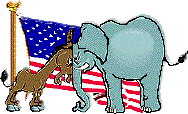 |
|
| U.S.
Government >
Political Parties |
|
Today, there are
two major political parties in the United States, the Democratic and
the Republican. See
also: |
|
| Texts are abridged from U.S. State Department IIP publications and
other U.S. government materials. |
|
| What kind of information
materials are available?
CD: These documents are available in fulltext format on the About the USA CD-ROM. Teachers: Request a copy for classroom use. L: Selected documents are available in German as well as other languages, including Arabic, Chinese, French, Spanish, Persian and Turkish. |
| DISCLAIMER Any reference obtained from this server to a specific commercial product, process, or service does not constitute or imply an endorsement by the United States Government of the product, process, or service, or its producer or provider. The views and opinions expressed in any referenced document do not necessarily state or reflect those of the United States Government. |
 U.S. Diplomatic Mission to Germany /Public Affairs/ Information Resource Centers Updated: February 27, 2009 |
